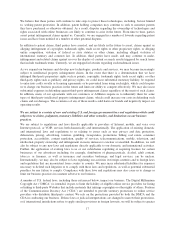Yahoo 2010 Annual Report Download - page 27
Download and view the complete annual report
Please find page 27 of the 2010 Yahoo annual report below. You can navigate through the pages in the report by either clicking on the pages listed below, or by using the keyword search tool below to find specific information within the annual report.Prolonged delays or disruptions to our service could result in a loss of users, damage our brands and harm our
operating results.
If we or our third-party service provider fail to prevent click fraud or choose to manage traffic quality in a way
that advertisers find unsatisfactory, our profitability may decline.
A portion of our display and search revenue comes from advertisers that pay for advertising on a price-per-click
basis, meaning that the advertisers pay a fee every time a user clicks on their advertising. This pricing model can
be vulnerable to so-called “click fraud,” which occurs when clicks are submitted on ads by a user who is
motivated by reasons other than genuine interest in the subject of the ad. On Yahoo! Properties and Affiliate
sites, we are exposed to the risk of click fraud or other clicks or conversions that advertisers may perceive as
undesirable. If fraudulent or other malicious activity is perpetrated by others and we or our third-party service
provider are unable to detect and prevent it, or choose to manage traffic quality in a way that advertisers find
unsatisfactory, the affected advertisers may experience or perceive a reduced return on their investment in our
advertising programs which could lead the advertisers to become dissatisfied with our advertising programs and
they might refuse to pay, demand refunds, or withdraw future business. Undetected click fraud could damage our
brands and lead to a loss of advertisers and revenue. Moreover, advertiser dissatisfaction has led to litigation
alleging click fraud and other types of traffic quality-related claims and could potentially lead to further litigation
or government regulation of advertising. Advertisers may also be issued refunds or credits as a result of such
activity. Any increase in costs due to any such litigation, government regulation or legislation, or refunds or
credits could negatively impact our profitability.
Fluctuations in foreign currency exchange rates affect our operating results in U.S. dollar terms.
A portion of our revenue comes from international operations. Revenue generated and expenses incurred by our
international subsidiaries are often denominated in the currencies of the local countries. As a result, our
consolidated U.S. dollar financial statements are subject to fluctuations due to changes in exchange rates as the
financial results of our international subsidiaries are translated from local currencies into U.S. dollars. In
addition, our financial results are subject to changes in exchange rates that impact the settlement of transactions
in non-local currencies.
We may be required to record a significant charge to earnings if our goodwill, amortizable intangible assets,
or investments in equity interests become impaired.
We are required under generally accepted accounting principles to test goodwill for impairment at least annually
and to review our amortizable intangible assets and investments in equity interests for impairment when events or
changes in circumstance indicate the carrying value may not be recoverable. Factors that could lead to
impairment of goodwill and amortizable intangible assets include significant adverse changes in the business
climate (affecting our company as a whole or affecting any particular segment) and declines in the financial
condition of our business. Factors that could lead to impairment of investments in equity interests include a
prolonged period of decline in the stock price or operating performance of, or an announcement of adverse
changes or events by, the company in which we invested. We have recorded and may be required in the future to
record additional charges to earnings if a portion of our goodwill, amortizable intangible assets, or investments in
equity interests becomes impaired. Any such charge would adversely impact our financial results.
We may have exposure to additional tax liabilities which could negatively impact our income tax provision, net
income, and cash flow.
We are subject to income taxes and other taxes in both the U.S. and the foreign jurisdictions in which we
currently operate or have historically operated. The determination of our worldwide provision for income taxes
and current and deferred tax assets and liabilities requires judgment and estimation. In the ordinary course of our
25
























